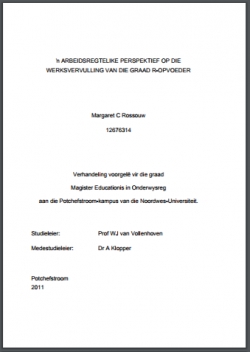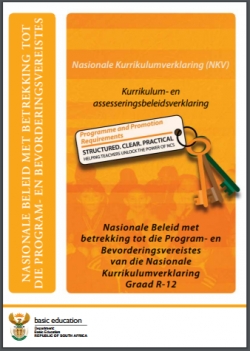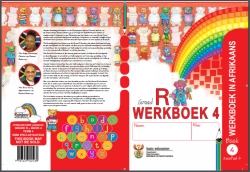'n Arbeidsregtelike perspektief op die werksvervulling van die graad R–opvoeder

Type
Thesis
Authors
Category
ECCE, Foundation
[ Browse Items ]
Publication Year
2011
Publisher
North West University, Potchefstroom, South Africa
URL
[ private ]
Pages
218 p.
Subject
Early childhood education, Early childhood development, Primary education, Education law, Labour law, Workplace security, Employer-employee relations, Workload, Psychological insecurity, Job satisfaction, Work fulfilment, Kindergarten teachers, Grade R ed
Tags
Abstract
Current policy to extend early childhood education by placing grade R in public primary schools is politically, economically and educationally motivated. Quality education in grade R has definite long-term economic advantages and could ensure equal educational opportunities. The educator is a key factor in this issue and her perception of her work life determines to a large extent the success of the initiative. The work fulfilment of the grade R educator is approached in this research from a labour law perspective and was conducted in the field of Education Law. The philosophic base of Education Law is found in the German educational term geborgenheit, which refers to the safety and security of all role players in education. The experience of security is regarded as a prerequisite for work fulfilment. The Constitution, education legislation, labour law, relevant case law and the common law were studied as legal determinants for work fulfilment. A qualitative enquiry into educators’ perceptions of their work life was conducted amongst participants in a specific area, which included schools from different socio–economic and cultural backgrounds. The essence of the findings is that, in spite of the existence of legislation which in principle should provide for physical and psychological security, educators still experience insecurity and therefore a lack of work fulfilment because of the ineffective implementation of law and policy. Widespread ignorance regarding the nature of quality education in grade R exists and the insistence on educator centralised teaching limits the work fulfilment of especially well–trained educators. Awareness of the advantages of a play based, whole–child approach has to be developed. This approach, as well as knowledge of legal determinants, promote work fulfilment since both serve the best interests of the child as well as the educator.
Number of Copies
1
| Library | Accession No | Call No | Copy No | Edition | Location | Availability |
|---|---|---|---|---|---|---|
| 1 | Potchefstroom, North West Province, South Africa | Yes |




